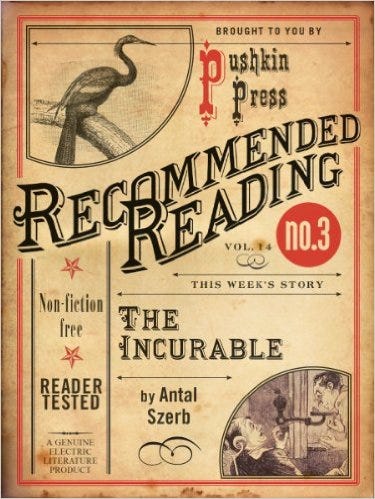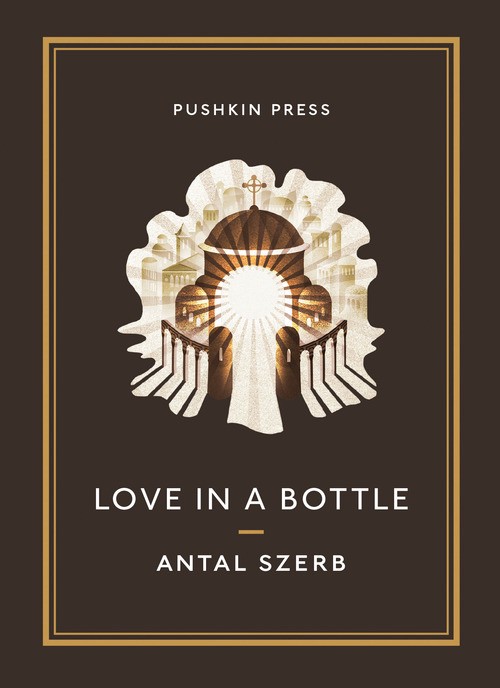Lit Mags
The Incurable
by Antal Szerb, recommended by Pushkin Press

EDITOR’S NOTE by Len Rix
“The Incurable” is taken from a volume of short stories entitled Love in a Bottle, by the Hungarian writer Antal Szerb. It was written after the author, a lifelong anglophile, had spent a scholarship year in London, most of it researching in the library of the British Museum, which features often in his writing. It was a place he loved above all for its quintessential Englishness — the blend of grandeur and eccentricity, the grave formality of its procedures and the wonderful collection of oddballs it invariably attracted, a world of interlocked and mutually incomprehending private obsessions. Obsession is a recurring topic in Love in a Bottle.

In this tale the obsession is of course that of the writer with his craft — a vice familiar to Szerb himself, who was prolific — not so much in the area of fiction but literary scholarship. In his short lifetime he published an astonishing range of critical and literary-historical works, while working as a language teacher in a commercial secondary school. His anglophilia was spontaneous and innate, but in the rabid right-wing climate of Hungary in the Thirties it also had a political dimension.
The art is that of caricature — consciously ironic, always affectionate — but the detail is unexpectedly precise. Even the improbable reference to football, the supposed FA cup tie between Bournemouth and Aston Villa, is subtly nuanced; as are the collection of uncles — the country doctor’s wife with the strange hats, the émigré to South Africa who sends native penny whistles to his nephews; and the family relations in his sister’s household.
Szerb is above all an ironic writer: with him it goes beyond manner. It is Jewish, Hungarian, Mittel-European. In his master work Journey by Moonlight, it darkens into a mode of apprehension that verges on the tragic. Here we find him in a purely playful mood, doodling gently with a theme that haunted his own life, one not unconnected with the darker forces in the culture that would, all too soon, lead to his pointless and appalling death.
Len Rix
Translator, Love in a Bottle
The Incurable
Antal Szerb
Share article
PETER RARELY WAS ON HIS WAY HOME BY TRAIN from Inverness in the Scottish Highlands, where he supported a course for students on the bagpipes, at his own expense, since everyone was complaining that with the advance of the gramophone and the radio this illustrious and ancient form of music was dying out. He had just been up for the closing ceremony and was feeling very pleased with the way things had gone. If only my bear sanctuary would do as well, he mused. Another of his great concerns was that these remarkable animals had become extinct in the British Isles, and he had made a home in the Welsh forests for some bears imported from Transylvania.
But his main worry was his number-counters. He had hired some unemployed people to count up to 7,300,000 without stopping. Two had already given up, three were still counting, but when he had left London even the best of them had only managed something like 1,250,000. Where might he have got up to since?
In the express dining car he caught sight of a familiar face. It was the writer Tom Maclean. Maclean was sitting on his own, sipping spoonfuls of mock turtle soup, gazing thoughtfully into the distance, and jotting down the occasional word on his notepad.
“May I?” Rarely asked, settling himself down beside the writer. “I’m not disturbing you?”
“You certainly are, very much so,” Maclean replied with obvious delight. “Please stay and disturb me some more. It would be a real kindness.”
Rarely began to feel somewhat alarmed. The thought had flashed through his mind that he might not be the most eccentric person on the train.
“Because, you see, I’m working,” Maclean continued. “I’m preparing notes for a radio broadcast about my Scottish experiences. At least while I’m talking to you I won’t be working. Sir, the amount I have to do is intolerable. I’m fed up with myself, absolutely fed up. I’ve just been to Scotland for a bit of a rest. I tell you — I was there for a month — in that time I translated a novel from the French, wrote two essays and a novella, eight sketches for the Morning Glory, six book reviews for the Spectator and ten longer articles for a forthcoming lexicon entitled Women, Children and Dogs in the Service of Humanity. And I’ve still got two radio talks waiting to be done.”
“That’s very interesting,” said Rarely. “I always thought that writers like you lay around all day waiting for inspiration, and then wrote only once it had struck. You seem to have a lot more to do than my own rather simpler sort of millionaire.”
“I’ve no idea how hard a millionaire works, because I heartily dislike those sort of people, present company always excepted, of course. But the number of things I have to deal with has become more than I can bear. You’ve just heard what my holiday consisted of. You can imagine how much I do when I’m actually working. I have to submit two novels to my publisher every year, three articles for the paper every week…then there are my book reviews and reader’s reports. I have to dash off the odd novella to show that I am still a creative writer, plus the odd bit of scholarship, so that I don’t get dulled by all the other writing; oh, yes, and the publicity notices for my friend’s books, and the little demolition jobs on those by my enemies…What does all that come to?”
“Monstrous. How do you manage it? When do you do all this writing?”
“You should really be asking, when do I not? I fall asleep writing, and wake up writing. I plan my hero’s fate in my dreams, and the moment I open my eyes the signing-off phrase for my radio broadcast comes into my head.”
“And when do you live?”
“Never. I’ve no time for sport, and none for love. For years the only women I’ve spoken to have been the ones bringing manuscripts, and believe me, they aren’t the most congenial. But that’s not the real problem. The problem is finding time to read.”
“But you’ve just been telling me about your book reviews and reader’s reports…You must surely have to read those, at least.”
“Oh yes, sir, I read an appalling amount — six or seven hours a day. But only the sort of things that publishers and editors lumber me with, or books I need for something I’m writing. Do you know, I would really love to read a book purely for its own sake. Something that’d be of no use to me whatsoever. The stories of Hans Christian Andersen, for example. For years I’ve been dying to read The Ugly Duckling and I’ve never got round to it.”
Rarely pondered this for a moment, then blurted out: “But why the devil do you work so hard?”
“For a living, my dear sir, to make a living. You of course wouldn’t know this, but ordinary people have to earn their crust. With you, its almost automatic. I’m not a popular writer, my books aren’t suitable for turning into films, I don’t have the sort of brazenness that would enable me to write plays. I’m just a grey literary journeyman, and I have to slave away morning, noon and night simply to make ends meet.”
“If I might ask a rather impertinent question, how much do you earn?”
“Five or six hundred a year.”
“What? For all that work? That is appalling. My heart really goes out to you. And you aren’t even a dying art-form, like the bagpipes.”
“I will be, sooner or later. Nobody wants the sort of thing I do.”
“Listen here, Maclean. I’ve a proposition to make. I’ll pay you a thousand pounds a year. Now, don’t jump up in excitement. Of course I’m not giving it to you for nothing. In return I would ask you, as from today, not to write another word. Not a single one. Do you accept my offer?”
“Do I accept? What a question! Do you think if my guardian angel flew in through the window I’d give her a good kicking? Sir, you are restoring me to life and humanity. There will be tears in my eyes every time I pronounce your name. Sir…my angel…henceforth I shall spend all my time fishing. And chasing women, women who don’t bring me manuscripts, and who never open a book. Illiterates, in fact. And I shall read The Ugly Duckling and the Summa of Thomas Aquinas. And I shall be the first happy writer in the history of literature. Because I won’t be writing.”
A month later Tom Maclean was visiting his sister Jeannie, the wife of Colonel Prescot, who lived in Bournemouth. They were talking over lunch about their far-flung family — Uncle Arthur the country doctor, and his wife who wore such very odd hats; Alastair, the famous seal hunter; John, who had bought a farm in South Africa and sent native penny whistles to the children; Mary, who had just married again; and poor Charles, who would never amount to anything.
“And how are you, Tom? Tell me about yourself,” said Jeannie. Since their mother’s death she had played a somewhat maternal role in his life. “Are you working a lot?”
“I’m not doing anything these days. I haven’t written a word for a month. I go fishing, and I read the foreign papers. I’ve learnt Portuguese — a wonderful language. Now I’ve come home for a week’s walking. I’ve bought myself two puppies — Sealyhams — and I’m training them up. And as for women…” And he lapsed into a bashful silence.
“Splendid. And are you happy?”
“Happy? I’m only now starting to feel really myself. I used to be a slave. The last dirty slave. These days I live like the Good Lord himself. In France.”
“I’m so glad, Tom, really glad. Because I’ve been wanting to say to you for some time that you should relax and join in with things a bit more. But what I don’t understand is why you look so unwell. Your face is rather pale and careworn. Why is that?”
“I’ve no idea. Perhaps all the walking — ”
“It’s as if you’re not really satisfied, Tom. Look, I know your face. There’s something missing in your life.”
“No, no. You’re quite wrong about that. I’ve never felt so well. I feel like a god!” he shouted angrily.
Jeannie was so astonished she made no reply.
They took coffee in the sitting room. Then Tom went through to the family library to stretch out and do some reading. There he found his fifteen-year-old nephew Fred sitting at the desk, scratching his head.
“Hello, Freddie. Why such a miserable face? Is some- thing wrong?”
“Wrong? It’s this pesky homework! I’ve got this essay to write for tomorrow, about Shakespeare and Milton. I’m supposed to ‘compare and contrast’ them. Isn’t that crazy? Why were these two blighters ever born? And it’s Bournemouth v. Aston Villa this afternoon.”
“Shakespeare and Milton? Hmm. You know what, my lad? You go off to the match, and I’ll write your essay. It’d be a shame to waste such a fine Sunday afternoon. Shakespeare and Milton. What a joke!”
“Would you really, Uncle Tom? I always said you were a thoroughly decent chap, Dad can say what he likes…”
And out he dashed.
Two hours later Jeannie came into the library. She found Tom working away feverishly, surrounded by densely scribbled sheets of paper, with a Shakespeare on the floor and Milton and the other classics scattered everywhere. The moment she entered Tom glanced up at the ceiling to show his irritation. He clearly didn’t take kindly to being interrupted.
“What are you doing, Tom?”
“Oh, er…I’m helping Freddie with his homework. ‘Compare Shakespeare and Milton,’ I ask you! At first glance, you’d never think what a good subject it is. I’ve written fifteen sides and still hardly touched on the matter. I think the teacher will be pleased.”
A few days later Tom Maclean called on Peter Rarely. He found the millionaire in his music room, working on an experiment to get thirty parrots to speak in chorus. He nodded briefly as Tom entered. The parrots, who were in the middle of “God Save the King,” fell silent.
“Sir,” Maclean began, very formally and clearly embarrassed. “I am compelled to renege on our agreement. I must ask you not to remit the usual sum next month. I’m terribly sorry. I know it’s not exactly playing the game, but I really have no choice in the matter.”
“What? You want to start writing again?”
“Again? Now I want to start in earnest. So far I’ve just been lazing around. I’ve got the outlines of a five-volume novel sequence, an autobiography of indeterminate length and a life of James IV of Scotland. It’s time I really got going on them.”
“But haven’t you been happy without your writing?”
“No, sir. It’s just no good. If you threw me in prison I’d write in blood on my underwear, like that Mr. Kazinczy my Hungarian friend told me about. I wish you good day.”
1937
About the Author
Antal Szerb was born in Budapest in 1901 and died in January 1944. The dates resonate. They create a frame. Initially a devout Catholic, he grew up in the shadow of his Jewish ancestry, amidst the collapse of Empire, the dismemberment of Hungary itself, two bloody revolutions, and the relentless drift towards war. He died in a forced labour camp just days before it was “liberated” by the advancing Soviet army.
Szerb’s achievements in that time are of two sorts: what he wrote, and what he became. Denied the university post he so richly deserved, he taught languages in a commercial secondary school. By personality he was perfectly unsuited for the role, and his students adored him. Toiling through the night, he produced volume after volume of critical and scholarly works, almost always breaking new ground. The aim was to show his countrymen the depth of their own tradition and the riches that lay beyond. Placing Hungary firmly in the Western tradition was a political as well as a cultural project.
At the same time he produced a series of enchanting novels and stories: playfully ironic, always gentle, they contemplate human folly with an amused tolerance. They never condemn. His last, Oliver VII, the most generously benign of all, was written with a yellow star in the ascendant. Those who knew him thought him the cleverest, and the kindest, man they had ever met.
About the Translator
Len Rix studied various languages before falling under the spell of Hungarian. In 2006 he was awarded the Oxford Weidenfeld Translation Prize.
About the Guest Editor
Pushkin Press was founded in 1997. Having first rediscovered European classics of the twentieth century, Pushkin now publishes novels, essays, memoirs, children’s books, and everything from timeless classics to the urgent and contemporary.
In 2013, Pushkin Press will publish a new edition of the short-story collection Love in a Bottle with a revised introduction and additional, never-before-published material by Antal Szerb (U.S. pub date: August 13, 2013).
Pushkin books represent exciting, high-quality writing from around the world. Pushkin publishes widely acclaimed, brilliant authors such as Stefan Zweig, Marcel Aymé, Antal Szerb, Paul Morand and Yasushi Inoue, as well as some of the most exciting contemporary and often prize-winning writers. Pushkin Press publishes the world’s best stories, to be read and read again.









